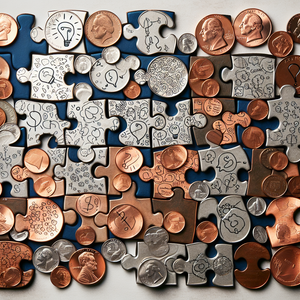The Art of Collecting: Harlan Crow's Curated Treasures

Harlan Crow's journey as a collector began in his formative years, shaped by an upbringing that valued history and culture. His eclectic collection includes a diverse array of art, artifacts, and rare books, spanning various epochs and styles. From stunning 18th-century American furniture to striking contemporary art, Crow’s discerning taste is evident in each meticulously chosen acquisition. Each piece in his collection is often imbued with historical significance, artistic merit, or a compelling narrative, underscoring Crow's appreciation for craftsmanship and storytelling. One notable example is Crow's ownership of paintings by iconic American artists, including works by Andrew Wyeth. These pieces not only hold immense aesthetic value but also serve as cultural artifacts that reflect the evolution of American heritage. By surrounding himself with such art, Crow creates a living environment rich in historical context, offering a daily reminder of the cultural narratives that shape society.
Investment and Wealth Preservation
While Crow’s passion for collecting is unmistakable, it also serves as a strategic investment approach. The art market has long been recognized as an alternative asset class capable of appreciating over time. Unlike traditional investments that may ebb and flow with market conditions, well-curated art can provide a hedge against inflation and economic instability. Crow’s collection exemplifies this principle, as many pieces have experienced significant appreciation since their acquisition. Furthermore, collecting serves as a tangible form of wealth preservation. In an age marked by financial volatility, assets like art and historical artifacts provide a sense of security. Crow's strategic selection of pieces often reflects not only personal aesthetic preferences but also a keen understanding of their potential for future value appreciation. This foresight positions him not merely as a collector but as a shrewd investor navigating the intricate landscape of wealth management.
Cultural Impact and Philanthropy
Harlan Crow's collections extend beyond personal enjoyment; they play a vital role in cultural preservation and education. Many of the artifacts in his possession are shared with the public through museums and exhibitions, allowing broader engagement with history and art that might otherwise remain obscured. By sharing his collection, Crow fosters a dialogue surrounding the importance of cultural heritage and the narratives encapsulated in each piece. In addition to his contributions to public institutions, Crow’s philanthropic initiatives often intersect with his passion for collecting. He has actively supported various arts and cultural organizations, recognizing the potential of his wealth to sustain and promote the artistic community. By investing in museums and educational programs, Crow leverages his collection to enrich the cultural landscape, ensuring that future generations can appreciate the treasures he has amassed.
Harlan Crow's art and artifact collection stands as a testament to the intricate connection between passion, investment, and cultural stewardship. His curated treasures reflect not only his personal interests but also a strategic approach to wealth preservation and investment. Through his commitment to collecting, Crow influences both the art world and the broader cultural narrative, illustrating that true wealth transcends mere financial metrics. It resides in the stories, history, and beauty that endure through time. As we explore the nuances of his collection, we are reminded of the enduring power of art as a vehicle for expression, investment, and legacy—an embodiment of the values and aspirations that define a modern tycoon.
Art Investment Analyst
Art advisory firms, investment banks, and wealth management companies
Responsibilities
Analyze market trends and evaluate potential art investments to advise collectors and investors.
Conduct thorough research on artists, artworks, and auction results to forecast value appreciation.
Prepare detailed reports and presentations for clients, highlighting investment opportunities in the art market.
Skills Required
Strong analytical skills and financial acumen, particularly in alternative investments.
Knowledge of art history and familiarity with major artists and movements.
Proficiency in data analysis tools and financial modeling.
Curatorial Assistant
Museums, galleries, and cultural institutions
Responsibilities
Assist in the organization and installation of exhibitions, researching artworks and their historical context.
Collaborate with artists, lenders, and other institutions to coordinate loans and acquisitions.
Engage with the public through tours and educational programs, enhancing visitor understanding of exhibits.
Skills Required
Strong organizational and project management skills, with an attention to detail.
Excellent written and verbal communication skills for cataloging and public engagement.
Background in art history or museum studies, with knowledge of preservation techniques.
Art Appraiser
Appraisal firms, auction houses, and independent consultancy practices
Responsibilities
Evaluate and provide written assessments of artworks for insurance, sale, or estate planning purposes.
Stay updated on market trends to accurately determine the value of various artworks.
Work with collectors and institutions to advise on the acquisition or deaccession of pieces.
Skills Required
Expertise in specific art genres or periods, along with certification in appraisal.
Strong negotiation and interpersonal skills for client interactions.
Familiarity with appraisal software and databases for market research.
Cultural Program Director
Non-profit organizations, cultural centers, and educational institutions
Responsibilities
Develop and manage educational programs and public events that promote cultural awareness and engagement.
Collaborate with artists, historians, and community leaders to curate impactful cultural experiences.
Oversee budgeting and fundraising efforts for programs and initiatives.
Skills Required
Strong leadership and strategic planning skills, with a focus on community engagement.
Experience in grant writing and fundraising for cultural initiatives.
Knowledge of cultural policies and trends affecting funding and programming.
Collection Manager
Museums, galleries, and private collectors
Responsibilities
Oversee the care, documentation, and maintenance of collections in museums or private collections.
Develop and implement policies for acquisitions, deaccessions, and conservation practices.
Coordinate with curators and other staff to ensure the effective display and storage of artworks.
Skills Required
Strong organizational skills and experience with collection management software.
Understanding of conservation techniques and legal aspects of collection management.
Ability to work collaboratively with diverse stakeholders in the arts community.


